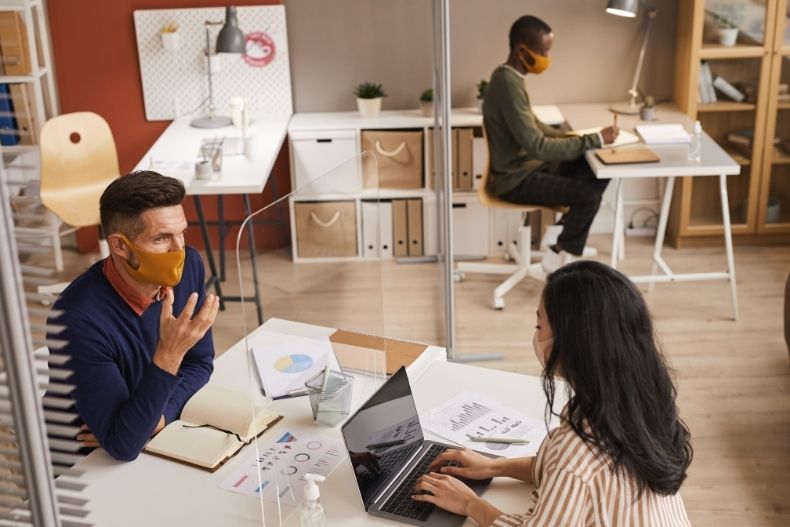If your business is getting ready for the long-awaited return to the new normal, it’s time to make a realistic assessment of how things will have changed, and to plan how you’ll make the transition. Traditional office features will be re-imagined for changing working models, the health of employees and visitors. In some cases, you may even be able to reduce your overheads.

Optimize use of space
The first question is, with at least some of your employees working from home at any given time, do you need all that space. Do you have private offices left empty half the time? If so, you’re paying rent for under-used space, not to mention utility costs and cleaning services. Optimize your use of space: open-plan offices, with fewer people, are the future.
Hygiene takes priority
Post-Covid, we’ll all be far more focussed on hygiene and safety, constant sanitization of shared spaces and equipment will be taken as an essential. Well-known commercial cleaning services in Bolton and towns with a similar business mix are already reporting unprecedented demand for schedules to be tightened and the supply of proven-quality disinfecting products to be increased. Enhancing the new security protocols on all areas in the office is important, from the front desk with disinfectant and signposting, to the bathroom with new cleaning appliances and clean and functional bathroom partitions.
Hot-desking
Hot-desking will mean that individuals sit at any available desk and log on. Each person is allocated a locker to store their items and any documents, securely. One people get used to the idea, and sit next to different colleagues each day, hot-desking has many benefits especially in encouraging open communication and knowledge-sharing.
Transparent screens on each desk, already a feature in many offices, especially when contact with the public is required, are essential in every communal working environment.
Online collaboration
With so many people working remotely, and contact taking place via zoom or other apps, online collaboration tools have become a must. Instant communication between team members and options for document sharing ensure work can progress smoothly with minimum unplanned downtime.
Uncluttered offices
As offices are rearranged to accommodate fewer people at once, you’ll likely find yourself with far more furniture and equipment than required. This could either be transported to employees to use at home (chairs, desks, well-functioning IT equipment, etc) or you could release cash from your investment by selling online. Just be mindful that computers rapidly become obsolete, so don’t delay in getting rid of them.
Focus on safety and air-quality
If you’re looking at a major revamp of your office space, it’s widely predicted that they should be adapted to ensure a far greater level of hygiene and infection control. Think about installing sinks and hand-washing stations in easy-to-access public areas, rather than just in bathrooms or pantries.
Communal kitchens will probably soon become a memory. Confined spaces where people once enjoyed gathering and socializing will be thought of as less desirable.
The need for good air-quality and circulation systems will take higher priority. In older premises, you may need to improve these to maintain a safe working environment and avoid the spread of bacteria or viruses.
Companies with financial resources will be investing in thermal body scanners, for employees and visitors, which will indicate when a person’s body temperature is raised. Overall, reporting to work when you’re feeling sick will become increasingly unacceptable.